Featured
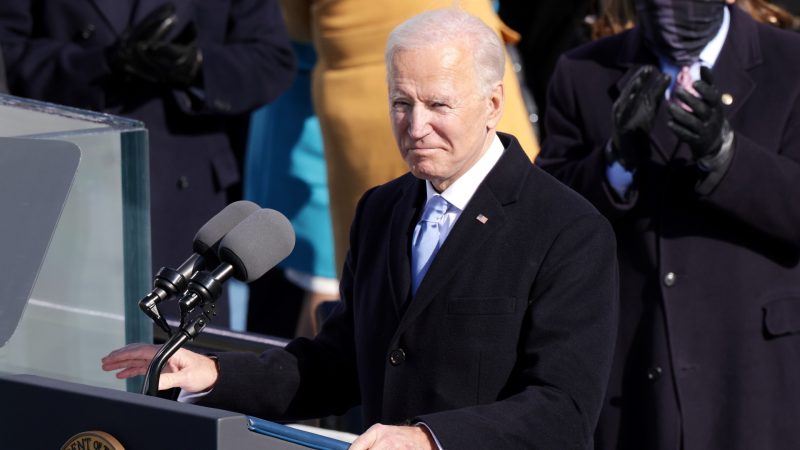 Joe Biden delivers one of the best inaugural addresses in memory. By Jennifer Rubin / Wash Post
Joe Biden delivers one of the best inaugural addresses in memory. By Jennifer Rubin / Wash Post
From the somber, elegant memorial service Tuesday night at the Lincoln Memorial to the swearing-in of Joseph R. Biden Jr. as the 46th president and Kamala D. Harris as the first female, first African American and first Asian American vice president on Wednesday, we could feel not simply the beginning of a new presidency but also a new national ethos. The nation has not experienced in recent memory such a dramatic shift in presidential tone, rhetoric and symbolism. Even the simple declarations he made were reflective of the horrendous experiences we have endured under an unfit president. “I give you my word, I will always level with you. I will defend the Constitution. I’ll defend our democracy. I’ll defend America.” What a relief! Read more
Related: Who is Amanda Gorman? 22-Year-Old Recites Poem at Biden Inauguration. By Alexandra Alter / NYT
Political / Social
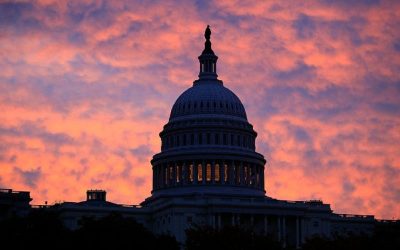 Ken Burns Says U.S. Has 3 Viruses: COVID-19, White Supremacy And Misinformation. By Rachel Martin / NPR
Ken Burns Says U.S. Has 3 Viruses: COVID-19, White Supremacy And Misinformation. By Rachel Martin / NPR
Filmmaker Ken Burns has spent his career documenting American history, and he always considered three major crises in the nation’s past: the Civil War, the Depression and World War II. Then came the unprecedented “perfect storm” of 2020 — and Burns thinks we may be living through America’s fourth great crisis, and perhaps the worst one yet. “We’re beset by three viruses, are we not?” he explains. There’s “a year-old COVID-19 virus, but also a 402-year-old virus of white supremacy, of racial injustice. … And we’ve got an age-old human virus of misinformation, of paranoia, of conspiracies.” Read more
Related: For the People Act: How Democrats Plan to Start Rebuilding Democracy. By Andy Kroll / Rolling Stone
 Obituary for a Failed Presidency. By Susan B. Glasser / The New Yorker
Obituary for a Failed Presidency. By Susan B. Glasser / The New Yorker
Precisely at noon on Wednesday, Donald Trump’s disastrous Presidency will end, two weeks to the day after he unleashed a mob of his supporters to storm the Capitol, seeking to overturn the election results, and one week to the day after he was impeached for so doing. He leaves behind a city and a country reeling from four hundred thousand Americans dead, as of Tuesday, from a pandemic whose gravity he downplayed and denied; an economic crisis; and an internal political rift so great that it invites comparisons to the Civil War. Read more
Related: Ta-Nehisi Coates on Donald Trump’s Legacy. “The First White President,” revisited. By Ta-Nehisi Coates / The Atlantic
Related: When Trump and others were silent after the Capitol breach, D.C.’s mayor stepped up. By Julie Zauzmer and Michael Brice-Saddler / Wash Post
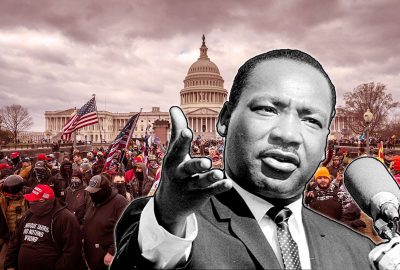 Would MLK have wanted “healing” after this outrage? Not without justice. By Chauncey Devega / Salon
Would MLK have wanted “healing” after this outrage? Not without justice. By Chauncey Devega / Salon
The real Dr. King would demand that substantive justice be done and that Donald Trump, his coup plotters, enablers and foot soldiers, and those others who participated in a lethal attack on the Capitol be held accountable. Such an outcome is not vengeance; it is justice. He also said, “He who passively accepts evil is as much involved in it as he who helps to perpetrate it. He who accepts evil without protesting against it is really cooperating with it.” Read more
Related: How the Ebenezer Baptist Church has been a seat of Black power for generations in Atlanta. By Jason Oliver Evans / The Conversation
Related: 127 Republicans Who Voted To Overturn The Election Results Are Now Praising MLK. By Nick Visser and Amanda Terkel / HuffPost
Related: MLK Day demands that Capitol rioters and white supremacists face swift justice. By Matthew Dallek / NBC News
Related: Martin Luther King Jr.’s legacy lives on in Rev. Dr. Raphael Warnock and Black liberation theology. By Anthea Butler / NBC News
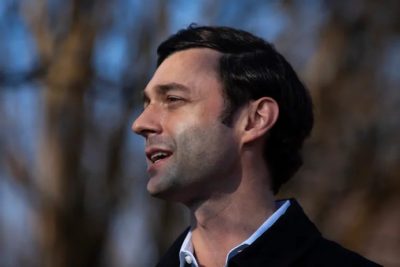 What Jon Ossoff means for the South and its buried Jewish past. By Steve Oney / Wash Post
What Jon Ossoff means for the South and its buried Jewish past. By Steve Oney / Wash Post
When it was clear after Georgia’s runoff elections earlier this month that Democrat Jon Ossoff had been elected to the U.S. Senate, making him the first Jew since 1974 to win statewide national office in the South, I thought of the haunting story of Lucille Frank’s interment, which Alan Marcus had shared with me while I was researching a book on the Leo Frank case. The two events are utterly dissimilar — the one fearful and furtive, the other triumphant and public — but they are inextricably linked. They connect the past and by most indications the future of Jewish life below the Mason-Dixon Line. Read more
Related: Can Raphael Warnock and Jon Ossoff reinvigorate the Black-Jewish alliance? By Jacques Berlinerblau and Terrence L. Johnson / Salon
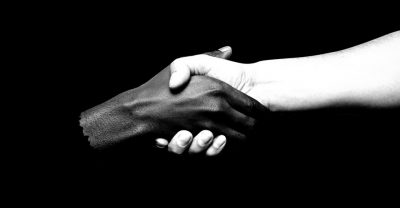 New data shows both a hopeful and worrying portrait of race in America. By Henry Olsen / Wash Post
New data shows both a hopeful and worrying portrait of race in America. By Henry Olsen / Wash Post
The most frightening data involves perceptions of racial discrimination today. More than 56 years since the passage of the Civil Rights Act of 1964, more than 80 percent of Black Americans still believe they face either a great deal or a lot of discrimination because of their race. The nation as a whole is split on this question; 50 percent of Americans say Black people face a great deal or a lot of racial discrimination and 50 percent believe they face a moderate amount, a little, or none at all. The parties are sharply divided over this question too, with about 80 percent of Democrats and Democrat-leaning independents in the first camp and about the same proportion of Republicans and GOP-leaning independents in the second camp. This sharp divergence in perceptions is one of the driving forces in politics today. Read more
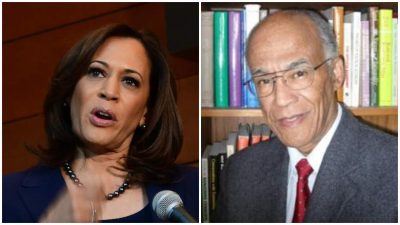 The Jamaican connection. By Robert Samuels / Wash Post
The Jamaican connection. By Robert Samuels / Wash Post
On a summer evening in 1978, Donald Harris took his two young daughters to the Greek Theatre in Berkeley, Calif., to their first concert. Kamala, the girl who would become vice president, was the eldest at 13. As she watched Bob Marley and the Wailers sing and sway at the outdoor arena on the campus of the University of California at Berkeley, she found herself mesmerized. “We sat up top in the back of the theater and, as I watched the performance, I was in complete awe,” Harris said in an email to The Washington Post. “To this day, I know the lyrics to nearly every Bob Marley song.” The experience was meant to be more than musical. Her father, a prominent Jamaican economics professor teaching at Stanford, was trying to imbue his two American-born girls with a sense of pride in their roots. Like the Harrises, Marley was from a parish on the north coast of the island called St. Ann. Read more
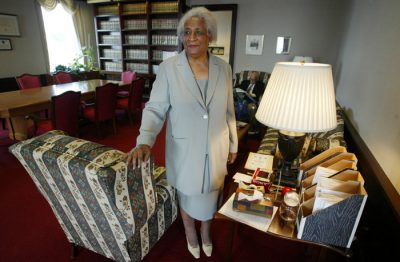 New Program Aims To Bring More Civil Rights Lawyers To The South. By Carrie Johnson / NPR
New Program Aims To Bring More Civil Rights Lawyers To The South. By Carrie Johnson / NPR
The NAACP Legal Defense and Educational Fund is launching a scholarship program designed to produce a new team of civil rights advocates working for racial justice in the South. Unveiled on Monday — Martin Luther King Jr. Day — the program will offer free tuition and room and board, a commitment intended to remove barriers for students deterred by the steep costs of law school. Once their program ends, the Marshall-Motley Scholars — named after a pair of the LDF’s most preeminent alumni, the late Supreme Court Justice Thurgood Marshall and the first Black woman federal judge, Constance Baker Motley — will commit to working on civil rights law in the South for at least eight years. The new scholarship program is in part named after the late Constance Baker Motley, seen here in 2004, who was the first Black woman federal judge. Read more
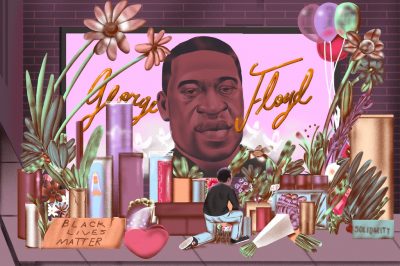 The Prophecies of George Floyd. By Michael Eric Dyson / The New Yorker
The Prophecies of George Floyd. By Michael Eric Dyson / The New Yorker
As Floyd continued to plead for his life, Chauvin announced that he was under arrest. “All right, all right. Oh, my God,” Floyd said. Then, eerily, as if the deed had already been done, he said, “Tell my kids I love them. I’m dead.” He soon fell unconscious and was hustled into an ambulance and sent to the hospital. He died of cardiac arrest an hour later. In 2008, while working on a book about Martin Luther King, Jr., I was struck by what I came to call King’s “automortology”—the manner in which he seemed to prophesy his own death, at times even narrating it as if it had already happened. Read more
 A Black Lives Matter Founder on Building Modern Movements. By Keeanga-Yamahtta Taylor / The New Yorker
A Black Lives Matter Founder on Building Modern Movements. By Keeanga-Yamahtta Taylor / The New Yorker
Alicia Garza, a co-founder of the Black Lives Matter Global Network and the originator of the generational slogan, has launched an extraordinarily well-timed book, “The Purpose of Power: How We Come Together When We Fall Apart.” Garza has been an organizer for more than twenty years, and the book is largely drawn from her experiences in a multitude of grassroots struggles. Born in Oakland in 1981, Garza has spent most of her life in Northern California. She was already active in campaigns against gentrification and police brutality when Oscar Grant III was killed by the Bay Area Rapid Transit police, on New Year’s Day in 2009, just blocks from her home. Read more
 A Disproportionate Share of COVID-19 Vaccines Are Going to White People. By Madison Pauly / Mother Jones
A Disproportionate Share of COVID-19 Vaccines Are Going to White People. By Madison Pauly / Mother Jones
With potentially lifesaving vaccines being rolled out nationwide, early data show that fewer initial doses of the vaccine are going to the communities of color most affected by the coronavirus. According to a Kaiser Health News analysis, Black people are being vaccinated at lower rates than white people in 16 states that provided racial data on vaccination distribution. Read more
Historical / Cultural
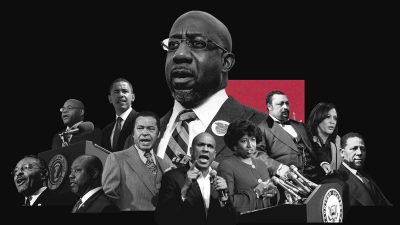 Raphael Warnock and the Solitude of the Black Senator. By Theodore R. Johnson / NYT
Raphael Warnock and the Solitude of the Black Senator. By Theodore R. Johnson / NYT
The Georgia pastor will be just the 11th Black U.S. senator. His victory came amid an attempt to delegitimize election results — a pattern for more than 150 years. In late January 1870, the nation’s capital was riveted by a new arrival: the Mississippi legislator Hiram Rhodes Revels, who had traveled days by steamboat and train, forced into the “colored” sections by captains and conductors, en route to becoming the first Black United States senator. Not long after his train pulled in to the New Jersey Avenue Station, Revels, wearing a black suit and a neat beard beneath cheekbones fresh from a shave, was greeted by a rhapsodic Black public. Read more
Related: Raphael Warnock and the Legacy of Racial Tyranny. By Jesse Wegman / NYT
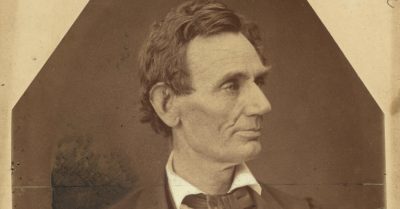 Lincoln Knew in 1838 What 2021 Would Bring. By Bret Stephens / NYT
Lincoln Knew in 1838 What 2021 Would Bring. By Bret Stephens / NYT
In January 1838, when Abraham Lincoln was a member of the Illinois state legislature and two weeks shy of his 29th birthday, he delivered what was probably the most prophetic speech of his political career. It’s a speech whose time has arrived again in 2021. The Lyceum Address is named for the Springfield, Ill., association that, according to Lincoln’s law partner William Herndon, “contained and commanded all the culture and talent of the place.” It concerns “the perpetuation of our political institutions.” Why would that matter in the still-young, ever-expanding American republic? An obvious answer would be the existence and expansion of slavery. Lincoln’s answer is the rise of the “mobocratic spirit” and the sorts of leaders who abet it. Read more
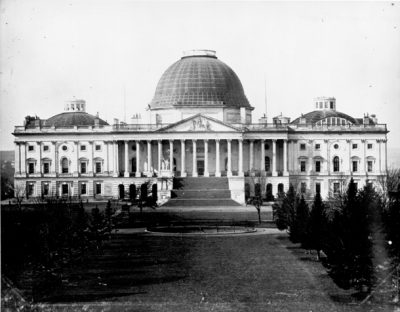 Enslaved Black craftsmen helped build the U.S. Capitol that a mob fueled by racist rhetoric stormed. By Felicia A. Bell / Wash Post
Enslaved Black craftsmen helped build the U.S. Capitol that a mob fueled by racist rhetoric stormed. By Felicia A. Bell / Wash Post
In 1822, Nathaniel Bowen, a free Black craftsman who labored at the Capitol construction site, was setting a large stone when the pulleys and ropes securing the nearly two-ton stone snapped, and Bowen was crushed to death. It is the only known fatality of a craftsman during construction of the Capitol, but hazardous conditions made illness and injury very common. In fact, during construction of the Capitol, the commissioners established a hospital and contracted physicians and nurses to attend the craftsmen. The enslaved craftsmen received treatment and preventive medicine such as bloodletting (a common medical treatment at the time) and inoculation against smallpox to keep them healthy so they could continue to work. Read more
 Trump Administration’s ‘1776 Report’ Justifies Slavery, Three-Fifths Compromise. By Sarah Ruiz-Grossman / HuffPost
Trump Administration’s ‘1776 Report’ Justifies Slavery, Three-Fifths Compromise. By Sarah Ruiz-Grossman / HuffPost
The “1776 Commission” — formed by Trump in September in direct response to The New York Times’ 1619 Project on America’s deep roots in slavery and racial injustice — released a report Monday that was meant to provide a “definitive chronicle of the American founding.” The 45-page report reads in places like a right-wing manifesto: It makes excuses for slavery and the Three-fifths Compromise that declared slaves counted as less than full humans. It decries socialism and “identity politics,” celebrates the right to bear arms and calls the anti-abortion movement one of the nation’s “great reforms.” The report notably defends the country’s Founding Fathers, who owned slaves, arguing that slavery was not “a uniquely American evil” and urging that “the institution be seen in a much broader perspective.” Read more
Featured: Donald Trump’s Dumb “1776 Project” Is a Perfect End to His Presidency. By Alex Shephard / New Republic
Featured: Pompeo, Who Celebrated His Own Italian Roots, Roasted For Tweet Opposing ‘Multiculturalism.’ By Zoe Richards / TPM
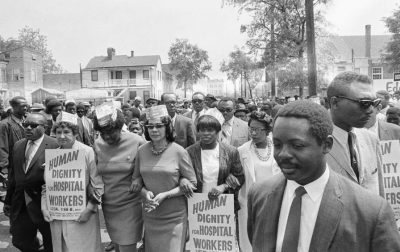 When Medicare Helped Kill Jim Crow. By Mike Konczal / The Nation
When Medicare Helped Kill Jim Crow. By Mike Konczal / The Nation
The history of health care in the United States also shows us another reason to keep the market in check when it comes to our freedom: Markets can perpetuate segregation and other unjust forms of exclusion. That was the case with the Southern hospital system under Jim Crow. Medicare played a key role in the destruction of the Jim Crow system in the South. And to understand how that happened, we need to see how health care evolved after the New Deal. Coretta Scott King (left, wearing sunglasses), widow of Dr. Martin Luther King Jr., leads a march in support of striking hospital workers through Charleston, South Carolina in 1969. Read more
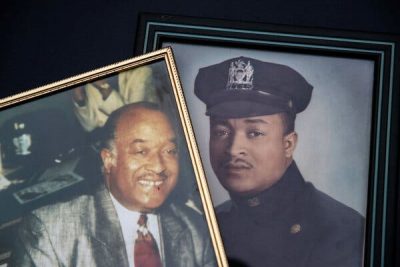 Before ‘I Have a Dream,’ Martin Luther King Almost Died. This Man Saved Him. By Michael Wilson / NYT
Before ‘I Have a Dream,’ Martin Luther King Almost Died. This Man Saved Him. By Michael Wilson / NYT
It was a warm and cloudless Saturday afternoon. Officer Howard, 31 years old and on the job three years, was driving a patrol car with a rookie he’d just met that day, Officer Philip Romano. A call came over the radio: There was a disturbance at Blumstein’s department store in Harlem. They arrived to find chaos on the second floor. At its center, in a dark suit and tie and sitting still as stone in a chair, was the Rev. Dr. Martin Luther King Jr., then 29. There was a letter opener jutting out of his chest. He had been signing copies of his book “Stride Toward Freedom,” about the Montgomery bus boycott, when a young woman approached and stabbed him. Read more
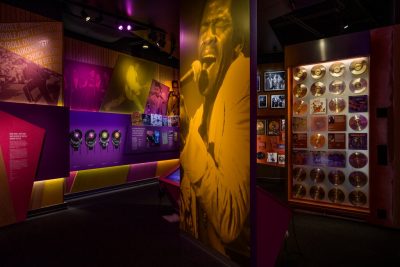 Black Music Has a New Home in Nashville. By Margaret Renkl / NYT
Black Music Has a New Home in Nashville. By Margaret Renkl / NYT
The National Museum of African American Music is opening in the capital of country music. And that’s exactly where it belongs.
The long awaited ribbon cutting for the National Museum of African American Music is Monday, Martin Luther King’s Birthday, in the heart of the tourist district here. But there’s still so much construction equipment enveloping 5th + Broad — Nashville’s sprawling new mixed-use development at the corner of Fifth Avenue North and Broadway — that the museum can be easy to miss. Read more
Sports
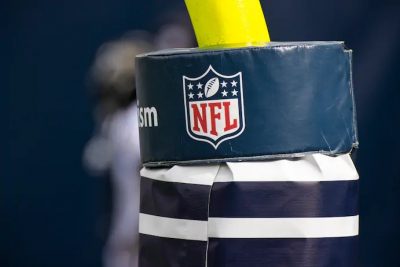 NFL diversity group calls the absence of new Black head coaches ‘mind-boggling.’ By Mark Maske / Wash Post
NFL diversity group calls the absence of new Black head coaches ‘mind-boggling.’ By Mark Maske / Wash Post
The diversity group that works with the NFL on its minority hiring practices expressed disappointment Tuesday with the results of this leaguewide hiring cycle for teams’ head coaches and general managers. With no Black head coaches having been hired to this point, the leader of the Fritz Pollard Alliance said the “disparity in opportunities is mind-boggling.” The results have come even after the NFL took steps to attempt to improve its minority hiring. “Thus far, the NFL hiring cycle of 2021 has not changed the rate of hires for Blacks as head coaches and primary football executives,” said Rod Graves, the Fritz Pollard Alliance’s executive director. Read more
Related: NFL owners love to extoll the Rooney Rule — and then hire White guys. By Sally Jenkins / Wash Post
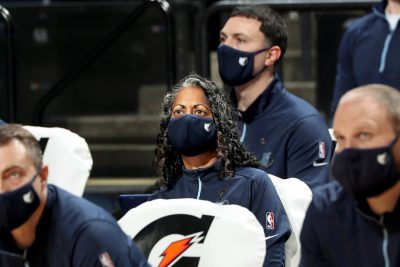 She Thought the Grizzlies Wanted Hiring Advice. They Wanted Her. By Scott Cacciola / NYT
She Thought the Grizzlies Wanted Hiring Advice. They Wanted Her. By Scott Cacciola / NYT
The women’s basketball team at the Massachusetts Institute of Technology knew something was up when Sonia Raman, the coach with the most wins in the program’s history, organized a video meeting on short notice in September. Most of the players figured it had to do with the coming season, and with complications stemming from the coronavirus pandemic. They were completely unprepared for the news Raman delivered — that she was joining the Grizzlies as an assistant coach. Read more
 HBO’s messy “Tiger” treats the controversial golf icon as salacious entertainment. By Kaitlin Thomas / Salon
HBO’s messy “Tiger” treats the controversial golf icon as salacious entertainment. By Kaitlin Thomas / Salon
The many scandals in Woods’ closet are part of him, part of his past, and therefore part of his legacy, and the documentary embraces this version of him. But the narrative often slides too far into the salacious aspects of Woods’ story rather than dig deep into the obstacles that Woods overcame first on his way to the top and then again in his comeback. In prioritizing the scandals “Tiger” only briefly flirts with the idea of being a compelling commentary on celebrity and expectations, on exploring racism in an elitist, traditionally white sport, and on the way America treats its sports heroes when they’re on the way up versus when they’re on their way down. Read more
Site Information
Visit our home page for more articles, book/podcast and video favorites. And at the top of this page register your email to receive notification of new editions of Race Inquiry Digest. Click here for earlier Digests.
About Race Inquiry and Race Inquiry Digest. The Digest is published on Mondays and Thursdays.
Use the buttons below to share the Digest in an email, or post to your Facebook, Linkedin or Twitter accounts.
Like this:
Like Loading...
 Joe Biden delivers one of the best inaugural addresses in memory. By Jennifer Rubin / Wash Post
Joe Biden delivers one of the best inaugural addresses in memory. By Jennifer Rubin / Wash Post Ken Burns Says U.S. Has 3 Viruses: COVID-19, White Supremacy And Misinformation. By Rachel Martin / NPR
Ken Burns Says U.S. Has 3 Viruses: COVID-19, White Supremacy And Misinformation. By Rachel Martin / NPR Obituary for a Failed Presidency. By Susan B. Glasser / The New Yorker
Obituary for a Failed Presidency. By Susan B. Glasser / The New Yorker Would MLK have wanted “healing” after this outrage? Not without justice. By Chauncey Devega / Salon
Would MLK have wanted “healing” after this outrage? Not without justice. By Chauncey Devega / Salon What Jon Ossoff means for the South and its buried Jewish past. By Steve Oney / Wash Post
What Jon Ossoff means for the South and its buried Jewish past. By Steve Oney / Wash Post New data shows both a hopeful and worrying portrait of race in America. By Henry Olsen / Wash Post
New data shows both a hopeful and worrying portrait of race in America. By Henry Olsen / Wash Post The Jamaican connection. By Robert Samuels / Wash Post
The Jamaican connection. By Robert Samuels / Wash Post New Program Aims To Bring More Civil Rights Lawyers To The South. By Carrie Johnson / NPR
New Program Aims To Bring More Civil Rights Lawyers To The South. By Carrie Johnson / NPR The Prophecies of George Floyd.
The Prophecies of George Floyd.  A Black Lives Matter Founder on Building Modern Movements.
A Black Lives Matter Founder on Building Modern Movements.  A Disproportionate Share of COVID-19 Vaccines Are Going to White People. By Madison Pauly / Mother Jones
A Disproportionate Share of COVID-19 Vaccines Are Going to White People. By Madison Pauly / Mother Jones HBO’s messy “Tiger” treats the controversial golf icon as salacious entertainment. By Kaitlin Thomas / Salon
HBO’s messy “Tiger” treats the controversial golf icon as salacious entertainment. By Kaitlin Thomas / Salon Raphael Warnock and the Solitude of the Black Senator. By Theodore R. Johnson / NYT
Raphael Warnock and the Solitude of the Black Senator. By Theodore R. Johnson / NYT Lincoln Knew in 1838 What 2021 Would Bring. By Bret Stephens / NYT
Lincoln Knew in 1838 What 2021 Would Bring. By Bret Stephens / NYT Enslaved Black craftsmen helped build the U.S. Capitol that a mob fueled by racist rhetoric stormed. By Felicia A. Bell / Wash Post
Enslaved Black craftsmen helped build the U.S. Capitol that a mob fueled by racist rhetoric stormed. By Felicia A. Bell / Wash Post Trump Administration’s ‘1776 Report’ Justifies Slavery, Three-Fifths Compromise. By Sarah Ruiz-Grossman / HuffPost
Trump Administration’s ‘1776 Report’ Justifies Slavery, Three-Fifths Compromise. By Sarah Ruiz-Grossman / HuffPost When Medicare Helped Kill Jim Crow. By Mike Konczal / The Nation
When Medicare Helped Kill Jim Crow. By Mike Konczal / The Nation Before ‘I Have a Dream,’ Martin Luther King Almost Died. This Man Saved Him. By Michael Wilson / NYT
Before ‘I Have a Dream,’ Martin Luther King Almost Died. This Man Saved Him. By Michael Wilson / NYT Black Music Has a New Home in Nashville. By Margaret Renkl / NYT
Black Music Has a New Home in Nashville. By Margaret Renkl / NYT NFL diversity group calls the absence of new Black head coaches ‘mind-boggling.’ By Mark Maske / Wash Post
NFL diversity group calls the absence of new Black head coaches ‘mind-boggling.’ By Mark Maske / Wash Post She Thought the Grizzlies Wanted Hiring Advice. They Wanted Her. By Scott Cacciola / NYT
She Thought the Grizzlies Wanted Hiring Advice. They Wanted Her. By Scott Cacciola / NYT